Global production of illegal timber down by 22 percent from 2002.
A new report by the Chatham House finds that illegal logging in tropical forest nation is primarily on the decline, providing evidence that new laws and international efforts on the issue are having a positive impact. According to the report, the total global production of illegal timber has fallen by 22 percent since 2002. Yet the report also finds that nations—both producers and consumers—have a long way to go before illegal logging is an issue of the past.
“If laid end to end the illegal logs would encircle the globe more than ten times over,” Larry MacFaul, co-author of the report, says, illustrating the sheer scale of the issue.
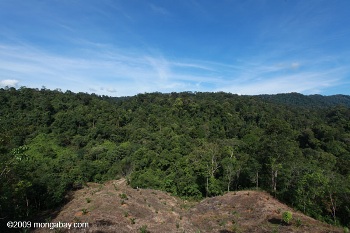 Deforestation for a new oil palm plantation at the edge of Gunung Leuser National Park on the island of Sumatra in Indonesia. The wood sold from clear-cutting is often used to finance the palm oil plantation. Photo by: Rhett A. Butler. |
Illegal logging worldwide comes with a host of environmental and social problems. Destruction of tropical rainforests releases vast amounts of greenhouse gas emissions, threatens biodiversity, and imperils other so-called ‘ecosystem services’, such as clean water. Given its unregulated nature, illegal logging often threatens indigenous people living in the forest, undercuts local communities and economies, and deprives governments in developing countries of revenue in the form of legal logging, or possibly carbon credits. Studies have shown that other environmental issues soon follow illegal logging, such as poaching and the bushmeat trade.
“Up to a billion of the world’s poorest people are dependent on forests, and reductions in illegal logging are helping to protect their livelihoods,” Sam Lawson, Chatham House Associate Fellow and lead author of the report, said in a press release. Chatham House, a London-based NGO, is devoted to independent analyses of international issues.
Producing Countries: Brazil, Indonesia, Cameroon, Malaysia, and Ghana
Looking at five of the world’s largest tropical timber producers, the study found that the majority of them had seen a significant drop in illegal logging over the last decade.
In the Brazilian Amazon, illegal logging plunged by 50-75 percent. According to the report, improved laws and regulations, along with increased enforcement had a major impact in Brazil. The number of enforcement officials dealing with illegal logging in Brazil jumped from 400 in 2003 to 3000 in 2007. However, even with this massive decline, 34 percent of Brazil’s timber output is still illegally sourced.
Indonesia has seen a 75 percent drop in illegal logging. According to the report improved governance, increases in plantation wood production, and pressure from NGOs have all improved the nation’s illegal logging problem, yet 40 percent of Indonesia’s wood production is still thought to be illegal. Following through on policies and regulations, as well as lack of enforcement, remain major stumbling blocks in Indonesia.
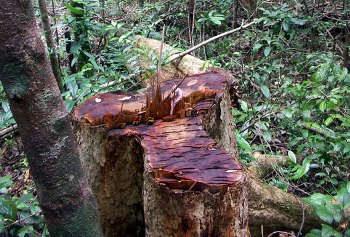 Rosewood logged in n Masoala National Park, a UNESCO World Heritage Site. While the report shows that a number of nations have seen declines in illegal logging, Madagascar has been hit by an illegal logging boom. Photo by: Rhett A. Butler. |
Cameroon has reduced illegal logging by half since 1999. According to the report, the
Independent Observer of Forest Law Enforcement and Governance—which monitors the trade—has had a big impact on reducing illegal logging in Cameroon. Pressure from European consumers has also had an impact. As with other nations, enforcement of regulations and laws remains a problem. In addition, the report recommends that Cameroon strengthen its laws.
According to the report, the decline in illegal logging in Brazil, Indonesia, and Cameroon has resulted in saving some 17 million hectares of forest from degradation (twice the size of Austria) and saved 1.2 billion tons of carbon from being released into the atmosphere. On the other hand, if these areas had been logged legally they could have brought in over $6 billion in revenue.
Stopping illegal logging entirely in these three nations would bring further benefits: preventing the release of 14.6 billion tons of carbon, equal to the amount emitted by human activities in six months times.
The report was more mixed on Malaysia and Ghana. While Malaysia has less overall illegal logging than the other nations evaluated, it has not seen any conclusive improvement over the last decade in combating the problem. Transparency is one of Malaysia’s largest problems.
Like Malaysia, Ghana did not appear to see any improvement in halting illegal logging over the last decade. Illegal logging remains rampant in Ghana, estimated at two-thirds of its total production, most of which comes from artisanal logging.
While illegal logging has declined or held steady in many countries, some have seen booms. For example, following a government coup, Madagascar has experienced an illegal logging crisis. Loggers have even entered National Parks seeking rare and precious rosewood trees and threatening the island nation’s unique biodiversity.
The report stressed that illegal logging is not a problem of the past. Given increased scrutiny, improved laws, and in some cases better enforcement, the practice of illegal logging is moving from the more open cases to less detectable practices, for example when a company logs outside its permitted area or receives illegally issued licenses to clear-cut forest for agriculture.
Consuming Countries: the US, Europe, and Japan
Despite its environmental and social costs, the market for illegal tropical timber is booming. Without demand for illegal timber, the trade would dry up. Yet, according to the report, demand remains high in many of the world’s wealthiest nation: the United States, Japan, the UK, France, the Netherlands, and, by far the biggest of all, China.
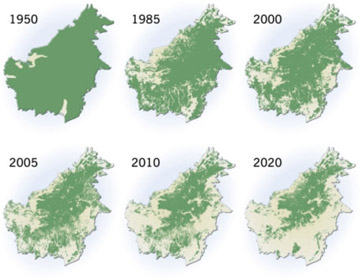 Extent of Deforestation in Borneo 1950-2005, Projection to 2020. The island of Borneo is split between Malaysia, Indonesia, and Brunei.While illegal logging is down in Indonesia, it remains unchanged in Malaysia. |
In 2008 the five consuming countries looked at by the Chatham House—excluding China—purchased 17 million cubic meters of illegal harvested timber and wood products from illegally sources. The illegal wood coming into these countries was valued at $8.4 billion for the one year. Much of the illegally harvested wood comes in the form of furniture or plywood: after being cut it is often sent to China for processing and then exported to these big consumers.
However, recently consuming nations have begun to make big moves against illegal logging. In 2008 the US passed an amendment to the Lacey Act that made it illegal for companies to buy, sell, or hold illegally harvested timber. It was the first law of its kind. The EU has since followed: just last week the European Parliament voted to ban illegally-harvested wood from its markets, although the rule won’t go into effect until 2012 and 2017 for paper products. It will take time to see how effectively these new laws—placed in some of the world’s biggest markets for illegal wood—address the problem. Initial reports regarding the US law have been generally positive.
“The effort to combat illegal logging and improve forest governance has brought developed and developing countries together in a unique way with a shared sense of purpose,” said Lawson. “Our study shows that consumer interest and pressure combined with action by producer countries can yield very positive results.”
Illegal wood made up between 2 to 4 percent of the total wood consumed in the US, UK, France, and the Netherlands. However, that percentage jumps in Japan. Approximately 9 percent of wood products sold in Japan are sourced illegally. In terms of laws and regulations to deal with the trade, Japan has fallen behind both the US and Europe. The report recommends that Japan adopt legislation that bans illegally-sourced timber from its markets.
Wild card: China’s role in illegal logging
It has become impossible to discuss the problem of illegal logging during the past decade without mentioning one nation in particular: China. The world’s rising superpower has become the de-facto hub for illegal logging: illegally sourced timber goes in and processed planks, furniture, or all manner of other produced wood products come out. They are exported worldwide and often sold cheaply.
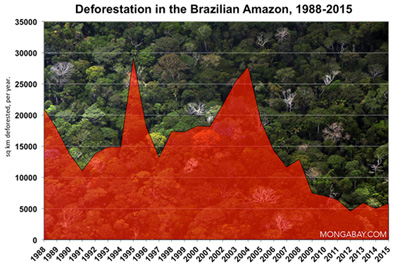 |
According to the report, one-fifth of China’s imported wood is illegally sourced, making China the world’s top importer and exporter of illegal wood: 20 million cubic meters of illegally sourced wood comes into China every year—more than the UK, US, Japan, the Netherlands, and France combined.
While China has begun talks with the EU and the US regarding illegal logging, Chinese officials are unable to stop illegal timber to date from entering the country due to a lack of laws against the practice. According to Chatham House, Chinese companies also see little impetus to seek legally-certified logs and are more concerned with price than legality. The report recommends that China adopt new laws banning illegal logging from its markets.
“Although illegal logging has declined, it remains a major problem and where progress has been made additional gains are likely to become increasingly hard to achieve,” states a Briefing Paper on the Chatham House report. “In seeking to bring illegal logging and associated trade to a complete end, it is important that policy-makers and other stakeholders take note of the lessons from the past and the changing nature of the problem.”
Related articles
Top officials busted in Amazon logging raids, but political patronage may set them free
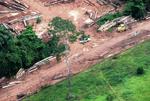
(07/08/2010) After two years of investigations, the Brazilian Federal Police arrested some of the most important politicians and authorities for illegal logging in the Amazon. Code-named Operation Jurupari, the Brazilian Federal Police uncovered a massive illegal logging scheme that resulted in the arrests of over 90 people and caused an estimated $500 million in damage to the Amazon rainforest. Over 496 square kilometers (192 square miles), an area the size of California or Spain, were affected and an estimated 1.5 million cubic meters (642 million board feet) of timber was illegally extracted. While the investigation focused on activities in the state of Mato Grosso, which is located in the southern Amazon and is one of the most deforested regions largely due to clearing land for expanding soya farms, it touched numerous others, including São Paulo, Paraná, Rio Grande do Sul, Espirito Santo, Minas Gerais and Distrito Federal.
The changing nature of illegal logging – and illegal logging investigations – in Brazil’s Amazon

(07/08/2010) Operation Jurupari followed on several previous Brazilian Federal Police investigations into SEMA, including: Operation Curupira I (June 2005); Curupira II (August 2005); Mapinguari (2007), Arc of Fire (2008), Termes (April 2008); and Caipora (2008). It was led by Franco Perazzoni, Brazilian Federal Police “Delegado” (or chief), who, since 2006, has headed the environmental crimes unit in Mato Grosso and been responsible for about 300 investigations on environmental crimes, of which about 75% were on illegal deforestation in federal areas. The nature of the illegal deforestation has changed over the years.
Violence a part of the illegal timber trade, says kidnapped activist

(07/07/2010) The European parliament made a historical move today when it voted overwhelmingly to ban illegal timber from its markets. For activists worldwide the ban on illegal timber in the EU is a reason to celebrate, but for one activist, Faith Doherty of the Environmental Investigation Agency (EIA), the move has special resonance. In early 2000, Doherty and an Indonesian colleague were kidnapped, beaten, and threatened with a gun by illegal loggers in Indonesian Borneo.
Europe bars illegal timber from markets

(07/07/2010) The European Parliament today voted overwhelming to bar illegally logged timber from E.U. markets. The legislation, which passed 644-25, will require all companies selling timber products in the E.U. to prove their wood is legally sourced. Companies that fail to demonstrate credible sourcing practices will be subject to fines. The rules will go into effect in 2012, but paper products will be exempted for five years.
The illegal logging cycle in Madagascar
(06/23/2010) The latest issue of the journal Madagascar Conservation & Development provides a comprehensive look into Madagascar’s illegal logging trade, which has generated more than $200 million for a small group of individuals over the past year. The trade, which spikes just prior to national elections and may be a source of funds for ruling politicians, has taken a heavy toll on the lowland rainforests of Madagascar, with targeted species now at risk of extinction.
(06/07/2010) On May 15th the West African nation of Gabon implemented a total ban on log exports. According to the International Timber Trade Organization (ITTO) the ban has been efficiently enforced to date and log exports from Gabon have “completely halted”.
French company to break moratorium on shipments of illegally logged rosewood from Madagascar
(06/03/2010) SEAL, a French transport company, is scheduled to ship 79 containers of rosewood tomorrow from the port of Toamasina on its vessel Terra Bona, reports Midi Madagascar. The shipment comes less than three months after Madagascar’s ruling authority banned timber exports after international uproar over the organized logging of the country’s national parks in the aftermath of last year’s military coup. SEAL’s shipment of timber will be in direct violation of the moratorium.
International alliance created to help corporations avoid illegal wood
(06/01/2010) Given the complexities of the global wood trade and the difficulty of deciphering a product’s source of wood, the World Resources Institute (WRI), the Environmental Investigation Agency (EIA-US and the US Agency for International Development (USAID) have banded together to create a global initiative, the Forest Legality Alliance, to aid private corporations to reduce the trade in illegal wood. The alliance’s formation comes after the US amended the Lacey Act in 2008 to ban the trade of illegal wood products in the US.
New timber ban failing to stop illegal logging in Madagascar
(04/04/2010) Rainforest timber continues to be cut illegally from Madagascar’s national parks despite a recently announced moratorium on precious wood exports and logging, reports a source from the Indian Ocean island nation.
Illegal logging rampant in Peru
(02/15/2010) A survey of 78 forestry concessions in Peru found that 46 (59 percent) were in breach of their concession contracts, reports the International Tropical Timber Organization (ITTO).
How to end Madagascar’s logging crisis

(02/10/2010) In the aftermath of a military coup last March, Madagascar’s rainforests have been pillaged for precious hardwoods, including rosewood and ebonies. Tens of thousands of hectares have been affected, including some of the island’s most biologically-diverse national parks: Marojejy, Masoala, and Makira. Illegal logging has also spurred the rise of a commercial bushmeat trade. Hunters are now slaughtering rare and gentle lemurs for restaurants.
Asia’s biggest logging company accused of bribery, violence in Papua New Guinea
(02/08/2010) A local organization in Papua New Guinea, known as Asples Madang, is fighting against one of the region’s biggest industrial loggers, Rimbunan Hijau (RH) chaired by billionare Tiong Hiew King. Aspeles Madang has accused Malaysian company, RH, of acquiring land illegally and of using brute force and bribery in its dealing with locals.







